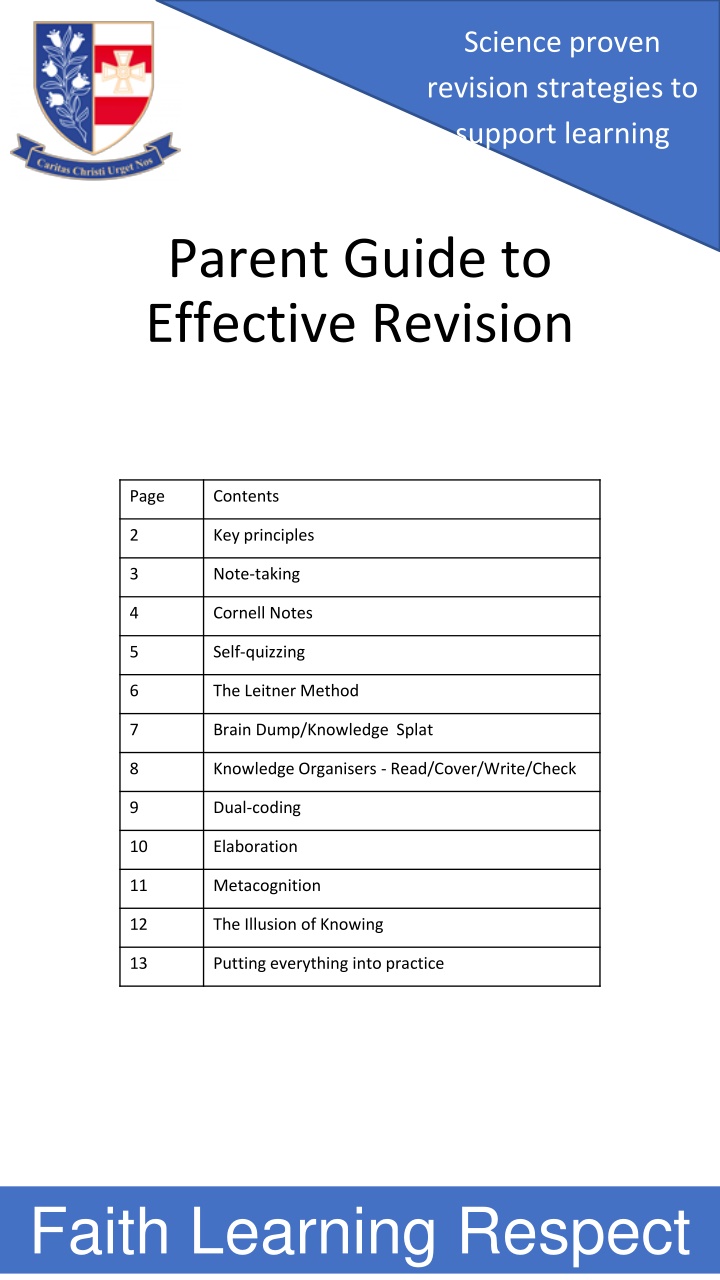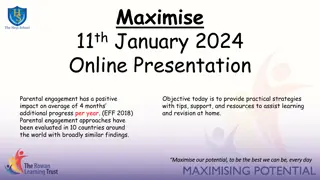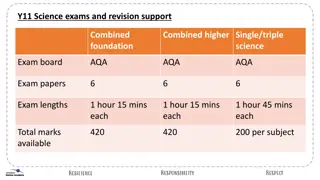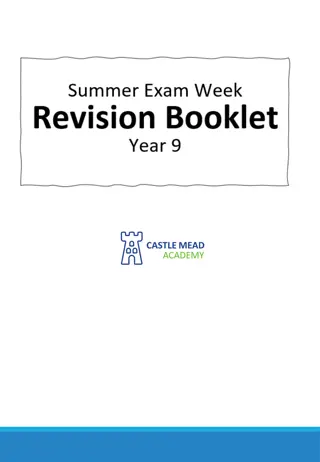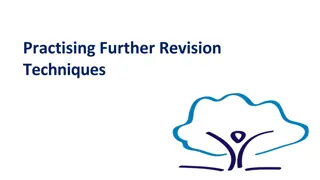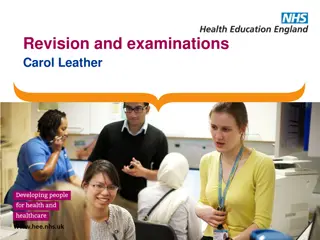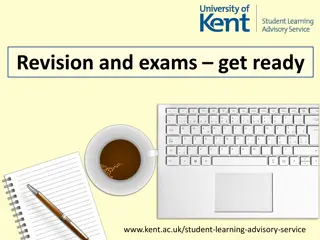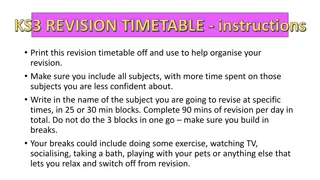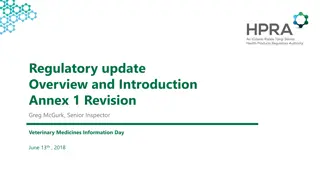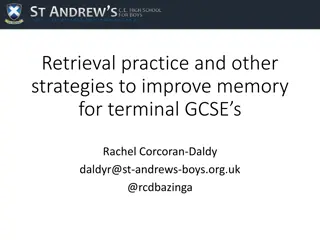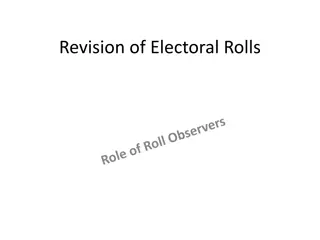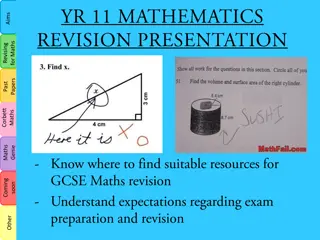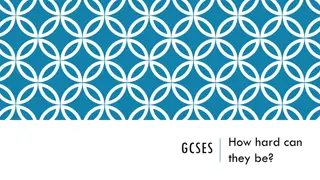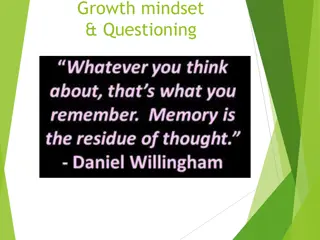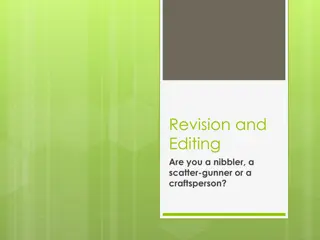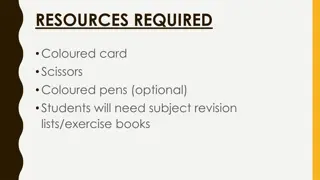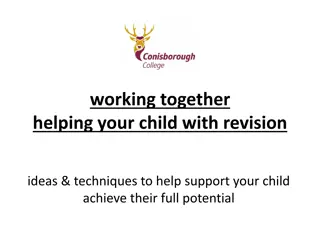Effective Revision Strategies for Optimal Learning
Recent research highlights key revision strategies for enhancing learning outcomes, including retrieval practice, spacing, elaboration, and dual-coding. Techniques such as note-taking, Cornell Notes, self-quizzing, and the Leitner Method are discussed in detail, offering practical guidance for effective revision. Encouraging teaching and self-explanation further supports retention and understanding.
Download Presentation

Please find below an Image/Link to download the presentation.
The content on the website is provided AS IS for your information and personal use only. It may not be sold, licensed, or shared on other websites without obtaining consent from the author.If you encounter any issues during the download, it is possible that the publisher has removed the file from their server.
You are allowed to download the files provided on this website for personal or commercial use, subject to the condition that they are used lawfully. All files are the property of their respective owners.
The content on the website is provided AS IS for your information and personal use only. It may not be sold, licensed, or shared on other websites without obtaining consent from the author.
E N D
Presentation Transcript
Science proven revision strategies to support learning Parent Guide to Effective Revision Page Contents 2 Key principles 3 Note-taking 4 Cornell Notes 5 Self-quizzing 6 The Leitner Method 7 Brain Dump/Knowledge Splat 8 Knowledge Organisers - Read/Cover/Write/Check 9 Dual-coding 10 Elaboration 11 Metacognition 12 The Illusion of Knowing 13 Putting everything into practice Faith Learning Respect 1
Science proven revision strategies to support learning Revision: Key Principles A lot of research has been done recently on the most effective study strategies. The main four are listed and briefly explained below: 1. Retrieval Practice: this is retrieving knowledge from memory, without any cues. 2. Spacing: this is leaving a gap between learning information and revisiting it. 3. Elaboration: this is using how and why questions to explain our learning. 4. Dual-coding: this is using images to help remember our learning. There is also research showing that teaching and self-explaining are very effective study strategies. Therefore, you can support your child by allowing them to teach you key content! 2
Science proven revision strategies to support learning Note-taking Note-taking is an important skill in school and beyond. It is useful for students to have a set of abbreviations to use for note-taking: Abbreviation/Symbol Meaning result of/consequence Therefore = equal to/the same as : Causes increase/decrease Cont d Continued Dev p Develop/development Sim/diff Similar/different W Writer R Reader Bc Because e.g. For example Ch Chapter Ln Line 3.1 Act 3 Scene 1 i.e. In other words Gov t Government Max/min Maximum/minimum P Page Re: Regarding Vs Versus w/ With * Important () Less important/extra information # Number 3 @ At Money/financial
Science proven revision strategies to support learning Cornell Notes Cornell Notes is a way of taking notes where students write key information and add cues (e.g. questions). They include a summary and a title. This method can be used when reading a text (lots of great revision articles on the British Library website) or watching a revision video. By writing how and why questions, this strategy makes use of elaboration. Title: Power in Macbeth Cues (questions) Notes What does usurpation means? Usurpation = taking a position of power that is not rightfully yours by force. Why is Macbeth's usurpation particularly shocking? Macbeth breaks the Divine Rights of Kings when he kills King Duncan. How does Banquo s ghost usurp Macbeth at the banquet? Banquo s ghost sits in Macbeth s place (at the head of the banquet table), symbolising that Macbeth is not the rightful king and that Banquo s children are prophesied to be kings. Summary: Power is represented in Macbeth through different layers of usurpation, beginning with Macbeth wrongfully taking the position as king. 4
Science proven revision strategies to support learning Self-quizzing Students can use their notes and key materials from lessons to self-quiz. This strategy makes use of retrieval. The process works in four steps: Step one: students read the key information (e.g. their notes on power in Macbeth) Step two: students conceal the information. Step three: students write down everything they can remember (if using a page of Cornell notes, they can use the questions they have written as cues). Step four: students look back over the key information to see how well they remembered it. This is the most important stage as it is where they evaluate their learning. They should use a different colour pen to fill in any gaps which become their focus for the next revision session. This self-quizzing process can be done in pairs with students questioning each other or with you questioning them. 5
Science proven revision strategies to support learning The Leitner Method The Leitner Method is a way of quizzing with flashcards where students move the cards to different compartments depending on whether or not they recalled the information correctly. This strategy makes use of retrieval and spacing. You can use this method with key vocabulary, key characters, key themes, key quotes or any factual knowledge. 6
Science proven revision strategies to support learning Brain Dump/Knowledge Splat A brain dump or knowledge splat is a very simple revision strategy involving dumping or splatting everything your child knows about a topic onto a black piece of paper. This strategy makes use of retrieval and works as shown below: Step one: students choose what they want to revise (e.g. the character of Lady Macbeth) Step two: students write down everything they can remember on this topic. Step three: students read over lesson material to see how well they remembered the chosen topic and check any errors. This is the most important stage as it is where they evaluate their learning. They should use a different colour pen to fill in any gaps or make corrections which become their focus for the next revision session. 7
Science proven revision strategies to support learning Knowledge Organisers - Read/Cover/Write/Check A knowledge organiser is a one stop source of information that covers the key knowledge on a particular topic. Knowledge organisers have different sections covering different information. Students can use them to revise and retrieve key knowledge using the Read/Cover/Write/ Check method. Below are instructions for students on how to carry out this method: Step one. Read over the section of information that is important for your revision. Step two: Cover the knowledge organiser or turn it over so you cannot see it. Step three: Write down everything you can remember on this topic. Step four: Check what you have written for accuracy and correct any errors or add any additional information that you have missed in a different coloured pen. 8
Science proven revision strategies to support learning Dual-coding Dual-coding is where images are used to help remember important information. Studies show that when students create their own image to represent a vocabulary word, they are more likely to remember it. Students could include simple images on flashcards and use these to test themselves on key vocabulary words or quotes. For example, students could use the images below to self-quiz on rhetoric by covering up the written information: 9
Science proven revision strategies to support learning Elaboration Elaboration is showing understanding of a topic by answering how and why questions. Below are some sentence stems students could use to practise this: How does X work? Why does X happen? Why does it make sense that _____? Why is this true? Why is X true and not Y? When did X happen? What caused X? What is the result of X? This is also a great strategy for students to practise self-explaining by answering these questions. If they explain them to a partner, they would be teaching another very effective revision tool. 10
Science proven revision strategies to support learning Metacognition Metacognition is thinking about thinking and students do this when they know how and when to use particular strategies in their learning. For example, they might use a Venn diagram to compare and contrast two different poems or themes before writing a paragraph that explores these similarities and differences. Metacognition also involves students being able to reflect on a revision session and identify their strengths and areas to improve in future sessions. Below are some questions students might ask themselves before, during and after a revision session: At the end of a revision session, students should make a brief note of what went well and targets to address in the next study session. 11
Science proven revision strategies to support learning The Illusion of Knowing Studies show that students often think they know and can remember knowledge but then forget it in a test. To avoid this, students should: 1. Test themselves after a delay. 2. Rate the likelihood they have answered correctly. Testing after a delay: Students might, for example, read a text on Macbeth then revise a different topic or subject area. They then write down the key information or a summary of the Macbeth text, without looking back at the text. They should then check their answers against the text and make a note of what they did not remember. Rating answers: Students might do some flashcard practice on key vocabulary words. They might then write down ten of the key words and give themselves a rating between 0 and 100 for how likely they are to get the answer correct. For example, if they immediately answered the flashcard on regicide correctly as killing of a king , they might rate this 100; if they hesitated with a word, they might rate this 60 and if they couldn t answer, they might rate this 0. This rating process ensures students spend more time on revising words they are less confident with. 12
Science proven revision strategies to support learning Help Videos Help Videos Look, cover, write, check. How to do it: https://www.youtube.com/watch?v=LLZvCymL4rU Key words and definitions. How to do it: https://www.youtube.com/watch?v=v8F1imMEBHU Mind maps. How to draw mind maps: https://www.youtube.com/watch?v=tIpK1-yKWk0 Flash cards. How to make them: https://www.youtube.com/watch?v=24mwa4gh8Pk Cornell Notes. How to use them: https://youtu.be/ErSjc1PEGKE 13
Science proven revision strategies to support learning Putting everything into practice Most of this booklet has been about revising and remembering key knowledge but, at some stage students will of course need to answer exam questions. A revision session, therefore, should start with some note-taking and/or self-quizzing but then use this knowledge recap to write sentences, paragraphs or full essays. This is where they think carefully about crafting, incorporating key vocabulary and knowledge into their writing. Exam question: How is power explored in Macbeth? Macbeth, the usurping tragic hero, defies the Divine Rights of Kings when he obtains power through regicide, questioning will all great Neptune s ocean wash this blood clean from my hands? The classical allusion to the Greek God of the sea creates a hyperbolic phrase, symbolising the great extent of Macbeth s guilt which even a divine ocean of water cannot remove. Hands is a recurring motif signifying guilt associated with power obtained through corrupt means and its ramifications. This is also seen later in the play when Before writing this paragraph, students might: Use The Leitner Method to quiz on the meaning of usurp , regicide , hyperbole , ramification and different types of allusions. Complete a Brain Dump on context in Macbeth (Divine Rights of Kings). Used Cornell Notes to self-quiz on the motif of hands on Macbeth. Use knowledge organisers to revise key information using look/cover/write/check. 14
